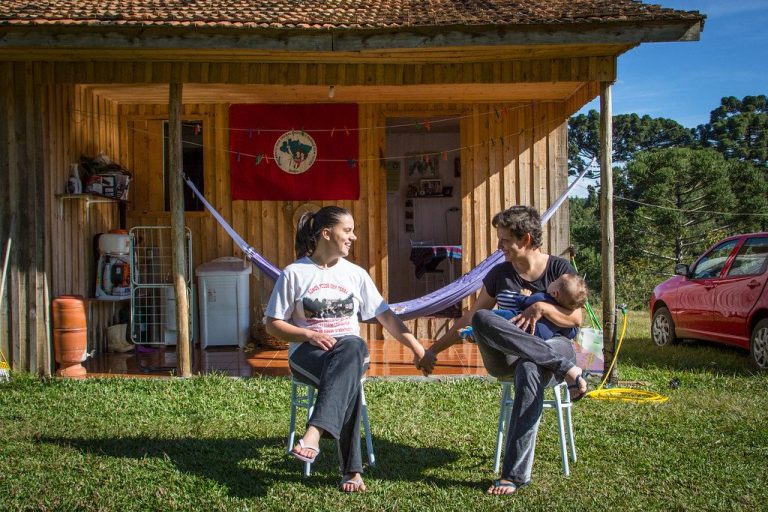Lesbian Visibility
The event includes activities like tree planting, meetings, and debates on how to promote safe and welcoming spaces for lesbians and allies.
In August, the lesbian community highlights its experiences, challenges, and achievements. The Lesbian Pride and Visibility Month is a season devoted to raising awareness about the issues faced by lesbians while promoting acceptance and equality. Bearing that in mind, the Landless LGBT Collective has proposed some activities to celebrate such an important period.
Lesbian visibility is a crucial element of the perpetual struggle for equality. For several years, the voices of lesbian women have been marginalized and underrepresented both by the media and by society as a whole. This Lesbian Pride and Visibility Month is a moment to celebrate the wealth of lesbian experiences, ranging from love and relating to one’s self to interpersonal and family relationships which determine their lives.
From a Landless perspective, by sharing their stories, lesbians from all places can inspire other people to embrace who they are with self-confidence and pride. August 29th was chosen as the National Day for Lesbian Visibility during the 1st National Lesbian Seminar (SENALE), an event held in Rio de Janeiro in 1996 under the subjects of “Visibility, Health, and Organization” to discuss sexuality, prevention, work, and citizenship.
From this point of view, the Landless LGTB Collective is promoting some initiatives aimed at approaching the issues which lesbian women still face, including discrimination, stigmatisation, and lack of recognition. The struggle for equal rights and social justice is an endless battle, and the Lesbian Pride Month reminds us of the importance of staying united in the pursuit of a more inclusive and fairer society.
During this month, in the encampments and settlements of the Brazilian Landless Workers’ Movement (MST), there will be activities such as tree planting, meetings, and debates on how to promote safe and welcoming spaces for lesbians and allies to gather, exchange experiences, and strengthen their struggle for land and equality. These celebrations not only develop bonds within the lesbian community, but also show the Landless people in general their unique vigour and diversity.
As the LGTB movement overcomes its challenges, it is important to remember that the fight for equal rights will not be over until all voices are heard and all identities are recognized. By celebrating the Lesbian Pride and Visibility Month, we move closer towards constructing a society in which all people, regardless of their sexual orientation, can live with dignity and authenticity.

Lesbophobia
The movement for equality and respect for LGBT people must recognise the specific nuances and challenges faced by different groups in the community and discuss them appropriately. A core element of this debate lies in approaching lesbophobia in a more focused and targeted manner rather than dealing only with LGBTphobia as a whole.
The first File on Lesbocide in Brazil, published in 2018, already gave signs of an increase in violence against lesbian women. The document highlights 180 homicides committed against lesbians between 2000 and 2017. However, most deaths are concentrated in the more recent years. From 2014 to 2017, there have been 126 registered murders in the country.
The file also reveals the distance between the two cases registered in 2000 and the 54 registered in 2017. Since 2013, numbers have been increasing constantly, especially between 2016 (30) and 2017 (54).
During the last few weeks, after lesbians in the legislative branch received threats of “corrective rape” in their institutional and personal e-mail addresses, the issue returned to the public agenda. Until now, complaints have been filed by federal deputy Daiana Santos, from the Communist Party of Brazil, Rio Grande do Sul (PCdoB-RS), state deputies Rosa Amorim, from the Workers’ Party in Pernambuco (PT-PE), and Bella Conçalves, from the Socialism and Freedom Party, Minas Gerais (PSOL-MG), and city councillors Mônica Benício, from Rio de Janeiro (PSOL-RJ), Iza Lourença (PSOL-MG), and Cida Falabella (PSOL-MG), both of whom from Belo Horizonte.
Lesbophobia refers to discrimination, prejudice, and hostility specifically targeted at lesbian women. Their experience is often silenced or belittled within the LGBT+ movement and in society as a whole. This might be due to the way lesbianity challenges gender norms and threatens male supremacy, leading to unique forms of discrimination which are worthy of specific attention and action.
Lesbophobic threats are also a display of Braziilian conservatism, which is fighting against recent changes in the country’s political representation, traditionally pervaded by white cisgender heterosexual men. They seem to be coordinated, given the importance of this month for the community and the role of these female politicians in this struggle.
The MST section of Pernambuco has issued a statement in defense of Rosa Amorim and other female members of parliament, emphasizing that “rape” and “lesbian conversion therapy” are often used to undermine LGBTI+ and women’s political participation. “Trying to silence a black Landless lesbian woman who has always struggled for a fairer and more equal society will not gag her. We believe all this story has only encouraged Rosa even more to go on fighting.”
This way we celebrate lesbians all over the world for their resilience, passion, and their priceless contribution to society. We shall move on, united in solidarity to make sure all voices are heard and all stories are valued. The Lesbian Pride and Visibility Month is a moment for celebrating love, singularity, and the power of living according to one’s true self.
Long live the lesbian women in the MST! Long live diversity and love!
By Fernanda Alcântara
First published on MST website on August 28, 2023
*Edited by Solange Engelmann
Mês do Orgulho e Visibilidade Lésbica: Honrando histórias e enfrentando desafios – MST

